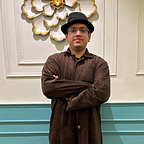Societyfy: An app made for finding company at anytime for anything
Origin of the idea
Imagine a situation where you are at a place where you don’t know many people and feel a bit left out. You feel hesitant to go out for lunch or hangout or even go to a movie alone. This is where the concept of Societyfy comes in to rescue you.
Societyfy is aimed at enabling people to find and meet people around them with the same interest or rather craving 😁 at that very moment through different chat rooms for each category.
I faced this problem myself when I first came to IITR, not knowing many people here. Soon after Season of Code was announced by MDG and this is when I decided to implement my idea and at the same time try my hands at Android Development😀. Around the same time, there were numerous workshops organised by MDG that helped me to get a taste of android dev and also sparked my interest in the same.
SoC Experience
1st Stage: Like any development competition, the first stage for getting selected into SoC was to submit our proposals with the concept properly explained. I didn’t have much of an idea about what all learning was required for completing the project but nevertheless I did a bit of google search and found out the basic stuff that was required for completing the project. Fortunately, my proposal was selected and I was one step closer to turning the idea into reality.
2nd Stage ( Planning Phase): After being selected for SoC, all the participants were assigned mentors. My mentors were Arnesh Agarwal and Prateek Sachan (both from 2nd year , I was in 1st year). This was the time when we discussed a lot about the workflow and concept of the app and planned the journey ahead. To get accustomed to the basics of android dev, they helped me a lot by providing me with some really great tutorials and blogs. I’ve added links to these blogs/tutorials at the end of the post.
3rd Stage (Coding Phase) : This was the stage when the real fun began and Societyfy started taking shape. I knew that it was going to be a challenge because, to fully develop your first app in 30 days is never easy. But I was ready.
First I set up the login/sign-up feature.
After that I worked on my home screen using cardviews and navigation drawer. All this time i had been using multiple activities but then I was informed by Arnesh that I needed to use fragments. I was like:
That took me nearly 5 days to learn at first with Google being my best mate in solving all the errors and rectifying the mistakes that I faced.
Then I started working on chat rooms which were relatively easy to pull off.
<<Drumrolls :P>> Now comes the flagship feature of Societyfy… In the users’ list of each chat room, you can view the users active in the chatroom at that particular moment and also check them out on the map. Wait wait…There’s much to the story, you can also get directions to any user in the user list!!!…Now that’s what I call a cool feature😀.
Now, came the moment to say:
4th Phase (Release phase) : After successfully completing SoC , Societyfy was released on GitHub. The link to the release is:
Future Scope
“Our work is never Over”
-Kanye West
As described by Kanye West, the work is never over…So there are still a lot of features that I would like to add to Societyfy. Some of which are:
Hide Location: I would like to make the user be able to choose whether to show his/her location on the map to other users by adding a toggle button for showing/hiding location.
Personal Chat rooms: I would also like to add the option of creating custom chat rooms so that the users can create chat rooms for themselves too.
Conclusion
So at the end, Societyfy was an amazing first project for my dev journey to take off. MDG proved out to be a catalyst for the same.
https://www.udacity.com/course/android-basics-user-interface--ud834 ( a great place to start learning the basics of android)
https://www.vogella.com/tutorials/AndroidFragments/article.html (a great read for implementing one activity architecture)
